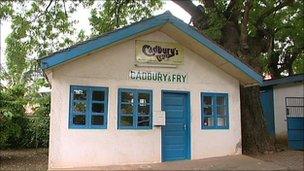Fairtrade hopes for Cadbury cocoa farmers in Ghana
- Published
Stephen Osuw is one of the luckier cocoa farmers in Ghana.
He is one of 200 who live in Adjeikrom, a village about two hours drive from the capital Accra. In Adjeikrom, Cadbury is working with the farmers to improve their yields.
It is hoped one day all the producers in the village will become Fairtrade, ensuring the farmers a guaranteed income and a premium price for their cocoa harvest.
But when asked if his cocoa plants generate enough money for his family to live on, Mr Osuw replies simply, "no".
Cocoa-farming in Ghana is facing problems.
As the cocoa plants age, the number of pods being produced by the plants is declining.
Plants, like the farmers, have an average age of 50. And the lower yield reduces income which in turn means farmers cannot invest in fertilisers or new plants to reverse the decline.

Cadbury is hoping 100 Ghanaian villages will become involved in Fairtrade production
Many of the younger people in the villages do not want to become cocoa farmers.
Instead they head for the bright lights of Accra rather than tend a plant which offers them a smaller and smaller return on their hard work every year.
Cadbury has been working since 2005 to try to help the farmers who provide the company with its raw material. And it all began in Mr Osuw's village.
Volunteers from the Bournville plant in Birmingham spent several weeks here building a new well for the village.
This was the start of a process of reconnection for the confectionery giant with those that supply its cocoa beans.
But rather than build more wells or new schools, the company instead selected 100 villages for a scheme to help raise declining cocoa yields.
Spending £45m pounds over 10 years, the idea behind the Cadbury Cocoa Partnership scheme is that villagers increase production and earn more cash from the cocoa and decide for themselves what to spend it on.
And alongside side the Cocoa Partnerships Scheme, last year Cadbury announced that all the cocoa used in its famous Dairy Milk bars would be from Fairtrade-certified cocoa communities.
Mobile clinic
That will eventually include the 100 villages in the partnership scheme itself. They should see increased yields and a premium Fairtrade cocoa price.
Already in the 18 months since Dairy Milk went Fairtrade, Cadbury said Ghanaian farmers have shared an extra £2.5m.
They have chosen to spend the money on various projects including a mobile clinic.
Since Cadbury made the decision to make its annual production of 300 million Dairy Milk bars Fairtrade the company has been taken over by US firm Kraft.
But Harriet Lamb, executive director of Fairtrade, is confident that Kraft will not draw back from any Fairtrade commitments and is "in it for the long term."
With more money to improve the harvest and a higher cocoa price guaranteed by Fairtrade, the villagers hope young people will stay close to home and follow on in the cocoa-farming tradition.
And Mr Osuw should find his cocoa plants once again produce enough income for him and his family.